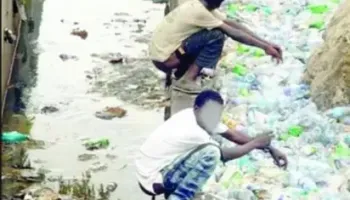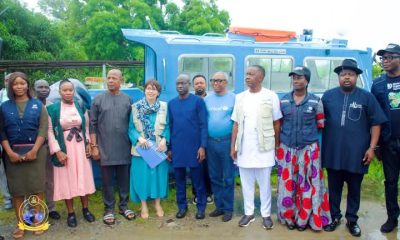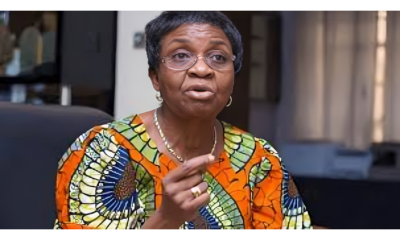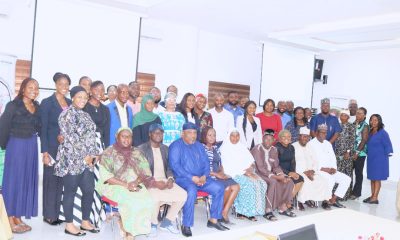Health
UNICEF Seeks Media Support On COVID- 19 Vaccine Logistics

From Ankeli Emmanuel, Sokoto
UNICEF Communication Specialist, Geoffrey Njoku has urged media practitioners in Nigeria to help carry our advocacy to both federal and State governments on the imperative to provide logistics support for the delivery of COVID-19 vaccines.
Njoku, asked the people to debunk the notion that the Western World was trying to reduce the nation’s population, noting that there were numerous other ways of doing that than using the vaccine if that was the intention.
Speaking at a two day media dialogue organized by The Child Rights Information Bureau (CRIB) of the Federal Ministry of Information and Culture in collaborarion with UNICEF on “Demand Creation For COVID- 19 Vaccines” held in Kano, Njoku appealed to media practitioners to help generate demands for the vaccine uptake as well as allay fears on the likely conspiracy theories about the safety of the vaccines.
Earlier in his welcome address, UNICEF Chief of Field Office Kano, Mr Maulid Warfa said the media remained one of their greatest partner towards having a better society for all.
Warfa who was represented by Rafid Salih, WASH Manager, UNICEF, Field Office, Kano added that people always believe the media for giving right and accurate information, adding however, that the same media could also help in misinforming people as well.
The Kano UNICEF boss tasked media practitioners to help communicate the reality about COVID-19 vaccines despite the feeling by some that its not 100 percent protective.
“But it is important for us to inform people that there are people in and outside the country that are interested in peoples health” he said.
Delivering a paper on “Debunking Rumours and Conspiracy Theories about COVID-19, the Vice Chancellor, Federal University, Kashere, Gombe State, Prof Umaru Pate said almost every subject in Nigeria is religionist, politicized, regionalised and given ethnic coloration hence making COVID- 19 vaccine acceptability was not any different.
He also lamented that although the new media (ICT) makes information readily available to people within a very short period of time, it has equally helped in creating doubts in the minds of information consumers by misinformation.
“In fact, in history, ICT has been the main stay of media sustainability. But they manifest in spreading of fake news, offensive speech and provocation of conflict and crisis.
“Societies are worried on the prevalence and consequences as well as misuse of the digital, online and social media to the extent that the conventional media and individuals are deeply involved”.
According to Pate, there is misinformation, disinformation and about COVID- 19 especially that it came in the era of internet, social media and digital communication.
He, therefore, urged media practitioners to have a high level of understanding to detect fake news because its sometimes so beautifully written.
“The average age of Nigerians that listen to radio lately is sharply declining. Therefore, debunking the load of fake information about the vaccination should be multifaceted, it should not be medicalised or highly politicised.
” Efforts should focus on active leadership involvement at all levels, community engannents, informed media engagement as well as intensive awareness campaigns to help in debunking rumours and negative theories”, he stated.
Health
WHO Approves 2 New Vaccines to Protect Infants From RSV

The World Health Organization (WHO), on Friday, issued recommendations for two new immunisation tools to protect infants from Respiratory Syncytial Virus (RSV)They included a maternal vaccine, administered to pregnant women in their third trimester to protect their newborns.The other was a long-acting antibody injection for infants, which begins to protect within a week of administration and lasts for at least five months.
According to WHO, RSV is the leading cause of acute lower respiratory infections in children globally. It causes around 100,000 deaths and 3.6 million hospitalisations each year among children under the age of five, while infants under six months are most at risk.Alarmingly, 97 per cent of these deaths occur in low and middle-income countries, according to WHO.Although RSV can infect people of all ages, “it is especially harmful to infants, particularly those born prematurely,” a WHO official, Kate O’Brien, said.O’Brien added that around half of all RSV-related deaths occurred in babies younger than six months.Considering the global burden of severe RSV illness in infants, WHO recommended that all countries adopt either the maternal vaccine or the antibody injection as part of their national immunisation strategies.“These RSV immunisation products can transform the fight against severe RSV disease, dramatically reduce hospitalisations and deaths, and ultimately save many infant lives worldwide,” O’Brien said. (NAN)Health
UNICEF Promotes Menstrual Hygiene for Girls

The United Nations Children’s Fund (UNICEF) has encouraged girls to embrace menstruation with pride and confidence, recognizing themselves as vital contributors to humanity’s sustainability.
Mrs Aderonke Akinwole, Social and Behavioural Change Specialist at UNICEF, gave the advice during an event on Wednesday organised with the Nigeria Girls’ Guild and Lagos State Primary Health Care Board.
The event was held to commemorate Menstrual Hygiene Day (MHDay) and was attended by students from both public and private schools across Lagos.
With the theme ‘Together for a Period Friendly World,’ the event aimed to raise awareness and promote dignity in menstrual hygiene.
“When a girl begins menstruation, it should be celebrated. It signifies her transition into womanhood and her ability to sustain life.
“They should be proud, and seek accurate, helpful information to remain safe, clean, and healthy during their period,” Akinwole said.
She emphasised that girls must not feel ashamed, as menstruation is a natural part of womanhood and a symbol of female dignity.
She urged the state government to increase sensitisation efforts and include menstrual hygiene education in school curricula, religious settings, and community platforms.
Akinwole also warned against stigmatisation, especially from boys, and called for boys to be educated to respect menstruation as part of girls’ lives.
“Girls should understand the menstrual cycle even before it starts. This should be part of health education in schools, churches, mosques, and communities,” she said.
She explained that girls need awareness on menstrual hygiene management and should know how to prepare for their periods in a healthy, informed way.
Mrs Honfor Adesola, Director of Education at Lagos State Primary Education Board, commended UNICEF’s support in promoting menstrual hygiene and addressing issues affecting girls.
Adesola highlighted that maintaining menstrual hygiene is vital in preventing infections and ensuring comfort throughout the menstrual cycle.
She noted that the event also helped to raise awareness about the Human Papillomavirus (HPV) vaccine available free in health centres across Lagos.
“We’re here to mark MHDay and to engage girls on HPV awareness. The state government has provided the vaccine, and sensitisation must continue,” she explained.
She encouraged girls to discuss the HPV vaccine with their parents to gain consent, ensuring protection against cervical cancer.
“The vaccine is safe, effective, and accessible in state facilities for girls aged nine to fourteen, but many have not yet been vaccinated,” she added.
Meanwhile, Ethagah Divine, Head Girl of New Estate Baptist Secondary School, Surulere, called on NGOs to provide sanitary pads for girls.
She urged more campaigns and rallies to distribute free menstrual products, like UNICEF did, to promote hygiene and dignity during menstruation.
Miss Emmanuella Azubuike, a student of the same school, expressed gratitude to UNICEF and partners for the impactful menstrual hygiene awareness event.
“This programme has expanded my knowledge on menstrual hygiene and HPV. More NGOs should support these campaigns to reach and educate more young girls,” she said. (NAN)
Health
Soludo’s Wife Establishes Pad Banks in 300 schools

Wife of Anambra State Governor, Dr Nonye Soludo, says she has established pad banks in 300 schools across the state as part of her pet project, Healthy Living Initiative.
Mrs Soludo disclosed this in a message in Awka on Wednesday to mark the 2025 World Menstrual Hygiene Day.
She said that the initiative was her own approach to helping school girls whose academic focus could be affected during menstruation and related emergencies.
Mrs Soludo stressed the need to provide immediate solutions for menstrual emergencies in schools, so that girls caught off guard could confidently rely on the pad banks.
“Official data say that an estimated 37 million women and girls in Nigeria are unable to afford sanitary pads and only rely on unhygienic alternatives.
“The data reinforce World Health Organisation and United Nations Children’s Fund finding that poor water, sanitation and hygiene infrastructure hinders safe and dignified menstruation for women and girls.
“Other data say that only two in five schools globally offer menstrual health education and just one in three have bins for menstrual waste.
“These figures challenge key stakeholders to find practical solutions to address the root of the problem while the situation remains reversible.”
She called for intensified campaign to reach more women and girls currently facing menstrual hygiene challenges.
The governor’s wife noted that the growing number of women, especially girls, in urgent need of menstrual support makes it essential for stakeholders to re-strategise their campaign approach.
According to her, menstrual health remains the right of every girl-child.
She encouraged girls at the designated schools participating in the pad bank project to use the supplies with confidence.
Mrs Soludo assured them that her NGO was fully committed to restocking any of the pad banks that run out of sanitary products.(NAN)






























